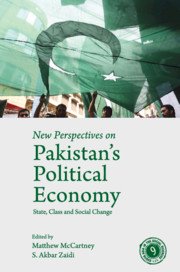New Perspectives on Pakistan’s Political Economy: State, Class and Social Change has been edited by Matthew McCartney and S Akbar Zaidi (Cambridge University Press, April 2019)
 Farman Ali
Farman Ali
A new book titled: “New Perspectives on Pakistan’s Political Economy:State, Class and Social Change” will soon hit the market.
Edited by Matthew McCartney, Director of South Asian Studies and Associate Professor in the Political Economy and Human Development of India, University of Oxford; and Syed Akbar Zaidi, Professor at Columbia University, New York, who is also Adjunct Professor at the Institute of Business Administration (IBA), Karachi. The book has been published by the Cambridge University Press in April 2019.
The book makes a major intervention in the debates around the nature of the political economy of Pakistan, focusing on its contemporary social dynamics.
This is the first comprehensive academic analysis of Pakistan’s political economy after thirty-five years, and addresses issues of state, class and society, examining gender, the middle classes, the media, the bazaar economy, urban spaces and the new elite.
The book goes beyond the contemporary obsession with terrorism and extremism, political Islam, and simple ‘civilian–military relations’, and looks at modern-day Pakistan through the lens of varied academic disciplines.
It not only brings together new work by some emerging scholars but also formulates a new political economy for the country, reflecting the contemporary reality and diversification in the social sciences in Pakistan.
The chapters dynamically and dialectically capture emergent processes and trends in framing Pakistan’s political economy and invite scholars to engage with and move beyond these concerns and issues.
The preface and introduction has been written by Matthew McCartney and S. Akbar Zaidi.
In chapter one, Matthew McCartney has discussed “In a Desperate State: The Social Sciences and the Overdeveloped State in Pakistan, 1950 to 1983.
In chapter two Dr Asim Sajjad Akhter, a left wing political activist who teaches at Quaid-i-Azam University sheds light on “The Overdeveloped Alavian Legacy”. Aqil Shah discusses “Institutions Matter: The State, the Military and Social Class” in the third chapter. Afiya Sheherbano Zia has contributed in the fourth chapter on “Class Is Dead but Faith Never Dies: Women, Islam and Pakistan”. Adeem Suhail has contributed in the fifth chapter on “The Amnesia of Genesis”. In the sixth chapter Danish Khan has discussed “The Political Economy of Uneven State-Spatiality in Pakistan: The Interplay of Space, Class and Institutions”. Rosita Armytage has contributed seventh chapter on “An Evolving Class Structure? Pakistan’s Ruling Classes and the Implications for Pakistan’s Political Economy”. Muhammad Ali Jan has written on “The Segmented ‘Rural Elite’: Agrarian Transformation and Rural Politics in Pakistani Punjab” in the eighth chapter. Umair Javed who teaches at Lahore School of Management Sciences (LUMS) and contributed column to Dawn has written on “Ascending the Power Structure: Bazaar Traders in Urban Punjab” in the ninth chapter.
Hassan Javid has contributed the ninth chapter on “Democracy and Patronage in Pakistan”.
Dr Farooq Sulehria has contributed in the 10th chapter “From Overdeveloped State to Praetorian Pakistan: Tracing the Media’s Transformations”.
It is the updated and extended edition of the book written by Akbar S. Zaidi on political economy of Pakistan. It’s a useful reference book for university students and those political activists who are interested in Pakistan’s politics and economy.
